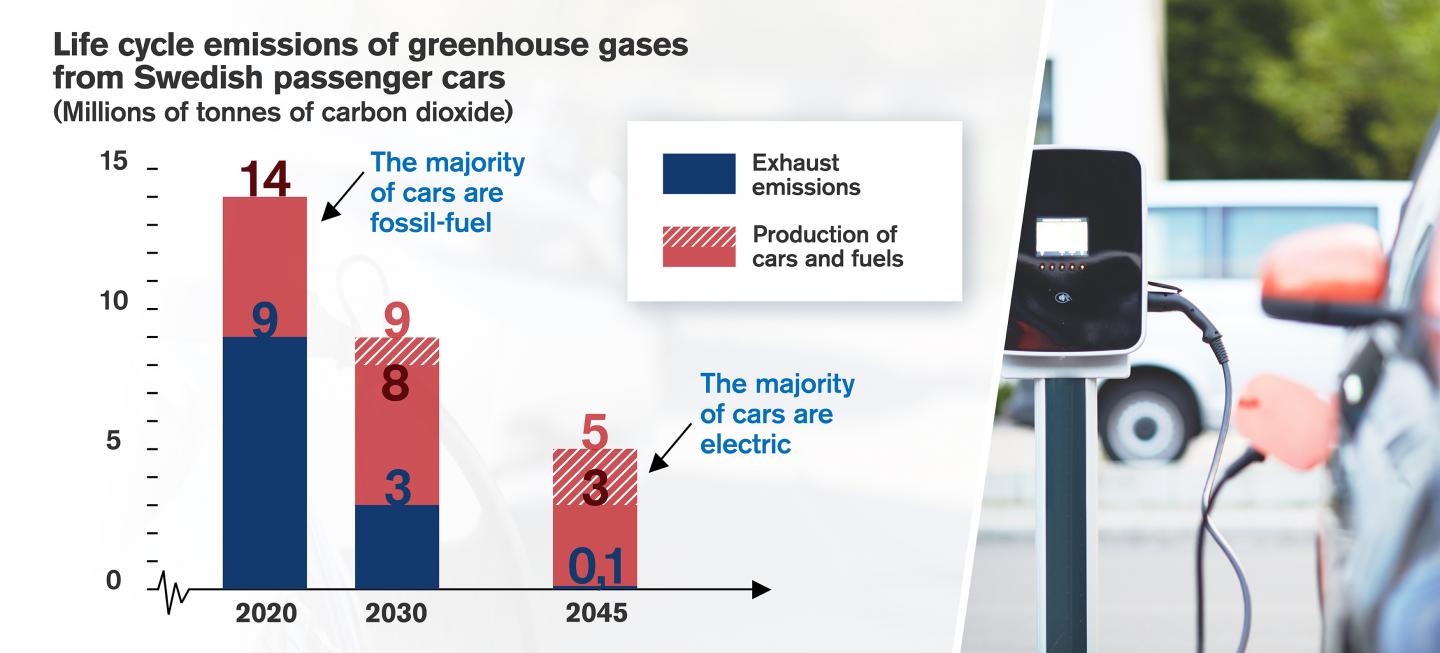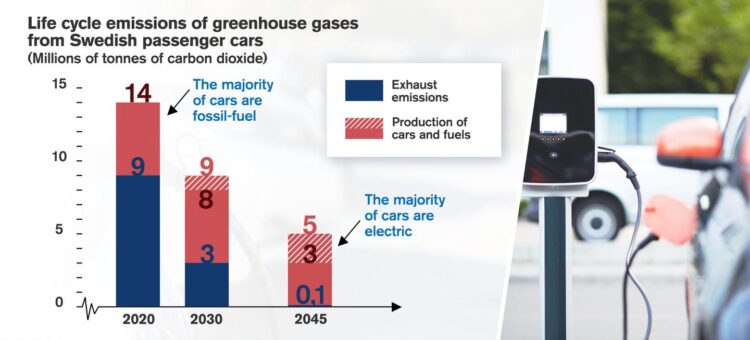
Credit: Illustration: Yen Strandqvist/Chalmers University of Technology
If a ban were introduced on the sale of new petrol and diesel cars, and they were replaced by electric cars, the result would be a great reduction in carbon dioxide emissions. That is the finding of new research from Chalmers University of Technology, Sweden, looking at emissions from the entire life cycle – from manufacture of electric cars and batteries, to electricity used for operation. However, the total effect of a phasing out of fossil-fuelled cars will not be felt until the middle of the century – and how the batteries are manufactured will affect the extent of the benefit.
A rapid and mandatory phasing in of electric cars could cause emissions from Swedish passenger cars’ exhausts to approach zero by 2045. The Swedish government has proposed an outright ban on the sale of new fossil fuel cars from the year 2030 – but that alone will not be enough to achieve Sweden’s climate targets on schedule.
“The lifespan of the cars currently on the roads and those which would be sold before the introduction of such a restriction mean that it would take some time – around 20 years – before the full effect becomes visible,” says Johannes Morfeldt, researcher in Physical Resource Theory at Chalmers University of Technology and lead author of the recently published scientific study.
To have the desired effect, a ban would either need to be introduced earlier, by the year 2025, or, if the ban is not brought in until 2030, then the use of biofuels in petrol and diesel cars needs to increase significantly before then – in accordance with the revised Swedish “reduction obligation”. The combination of these two measures would have the effect of achieving zero emissions from passenger vehicles and keeping to Sweden’s climate targets.
“The results from our study show that rapid electrification of the Swedish car fleet would reduce life cycle emissions, from 14 million tonnes of carbon dioxide in 2020 to between 3 and 5 million tonnes by the year 2045. The end result in 2045 will depend mainly on the extent to which possible emission reductions in the manufacturing industry are realised,” says Johannes Morfeldt.
A transition from petrol and diesel cars to electric cars will mean an increased demand for batteries. Batteries for electric cars are often criticised, not least for the fact that they result in high levels of greenhouse gas emissions during manufacture.
“There are relatively good opportunities to reduce emissions from global battery manufacturing. Our review of the literature on this shows that average emissions from global battery manufacturing could decrease by about two thirds per kilowatt hour of battery capacity by the year 2045. However, most battery manufacturing takes place overseas, so Swedish decision-makers have more limited opportunities to influence this question,” says Johannes Morfeldt.
From a climate perspective, it does not matter where the emissions take place, and the risk with decisions taken at a national level for lowering passenger-vehicle emissions is that they could lead to increased emissions elsewhere – a phenomenon sometimes termed ‘carbon leakage’. In this case, the increase in emissions would result from greater demand for batteries, and the risk is thus greater the higher the emissions from battery production.
In that case, the Swedish decision would not have as great an effect on reducing the climate impact as desired. The life-cycle emissions would end up in the upper range – around 5 million tonnes of carbon dioxide instead of around 3 million tonnes. Due to this, there may be reason to regulate emissions in both vehicle and battery production, from a life cycle perspective.
“Within the EU, for example, there is a discussion about setting a common standard for the manufacture of batteries and vehicles – in a similar way as there is a standard that regulates what may be emitted from exhausts,” says Johannes Morfeldt.
But, given Sweden’s low emissions from electricity production, a ban on sales of new fossil-fuel cars would indeed result in a sharp reduction of the total climate impact, regardless of how the manufacturing industry develops.
The results of the study are based on Swedish conditions, but the method used by the researchers can be used to obtain corresponding figures for other countries, based on each country’s car fleet and energy system. The year 2045 is highlighted because that is when greenhouse gas emissions within Sweden should reach net zero according to the climate policy goals of the country.
###
Read more about the revised Swedish “reduction obligation”:
http://www.
Media Contact
Johanna Wilde
[email protected]
Original Source
https:/
Related Journal Article
http://dx.





